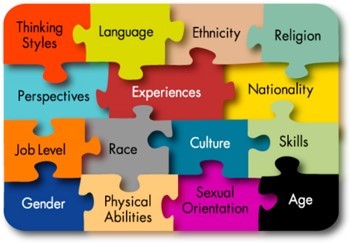It is no secret that diversity and inclusion have become controversial topics in today’s polarized political climate. Numerous national movements are rising to support feminism, immigration, and gender identity. While there has always been a push for companies to increase diversity in the workplace, as of recent, the demand has become even greater. Research continues to remind companies that diversity gives them access to a greater range of talent. It also provides insight into the needs of their customer or client base. In essence, diversity makes organizations more effective and more profitable, therefore more successful.
To fully understand the importance and benefits of diversity, one must understand its definition. Simply put, a diverse workplace is one inclusive of dissimilar individuals. It’s not only about how employees define themselves, but how others perceive them. Some of the most common differences lie within race, religion, culture, ethnicity, sexual orientation, gender, and age. It is believed that these differences are what allows a team to think in a broader sense and across many dimensions. This is typically not possible when team members represent the same group.
While there are studies that show countless benefits of diversity, three of the most common are 1) better identification of risk 2) better problem solving and 3) responding to client’s needs. Better identification of risk is based on the notion that different people tend to think differently and individuals who represent similar backgrounds and demographics tend to think the same. Therefore, a diverse team would be able to identify a possible risk, that would otherwise go unnoticed by a like-minded team. This same concept applies to problem-solving. When there is a wide array of minds in the room, there is a better chance of finding the solution to any given problem. Since clients consist of various types of individuals, their needs may vary. Therefore, it is crucial to have a diverse team that can relate or meet the needs of any type of client.
According to Forbes, the future success of any globally-oriented organization relies on their ability to manage a diverse body of talent, that can bring innovative ideas, perspectives, and views to their work. However, there are challenges to leading groups of people from different backgrounds, with wide-ranging aspirations and experiences, of different genders and ages, and they shouldn’t be underestimated. These challenges can be strategically turned into organizational assets, if an organization is able to capitalize on this melting pot of talents. Organizations would fare well, if they provided diversity training to equip their leaders with the tools needed to effectively manage their teams and ensure that their employees feel fully supported.
From conception, Curry Davis Consulting Group has been defying the odds when it comes to diversity. Not only is it a minority-owned company, but it is also owned and led by a woman. Across the board, women and minorities are underrepresented in the workplace in America. However, the CDCG team is comprised of mostly women and minorities, of diverse ages and backgrounds. Curry Davis Consulting Group is making a statement by defining the new status quo.


Leave a comment